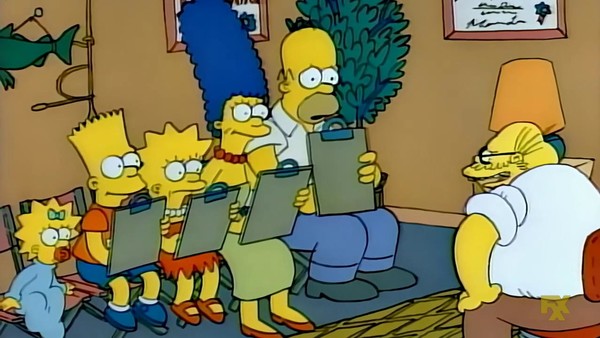The Exact Moment The Simpsons Lost Us
What Does The Simpsons Have To Say?

The episode Homer Vs Dignity sees the beloved everyman become a “prank monkey” for Mr Burns, a job which entails publicly embarrassing himself in exchange for extra pay. It’s a mean-spirited and dark instalment of the show which most viewers deride, but it’s one which signals a significant shift in the show’s approach to authority.
For The Simpsons’ first ten seasons or so, Mr Burns is unapologetically portrayed as a villain. A heartless, hateful tyrant, he’s a broad parody of the tragic billionaire embodied in fiction by Charles Foster Kane. This factory owner isn’t good-hearted but tragically corrupted, he’s an out-and-out bastard whose humanity has been worn away by years of over-the-top greed.
Whilst The Simpsons as a rule abhorred realism and certainly was no Malcolm in the Middle or even Bob’s Burgers in terms of centring a working class perspective, the stakes of the series when it came to work were always recognizable.
From its first episode wherein Homer can’t afford Christmas presents for his kids, the show famous for taking nothing seriously took the hard financial realities of life in America seriously. This wasn’t Modern Family, where money flows constantly and comfortably, its attendant woes never affecting the lives of its characters. Look throughout the series best-loved episodes and you’ll find countless moments, from the loss of Lisa’s pony to Homer’s “do it for her” collage, which underline the struggle that everyday Americans contend with thanks to the Mr Burns of the world.
Fast forward to Homer Vs Dignity, where Homer is in financial dire straits at the episode's beginning and gets out of paying at a restaurant... By playing in their mariachi band. He needs extra money because he's "too dumb" to budget, and within a few minutes of screen time has amassed so much extra cash that he feels compelled to give it to a good cause.
The boss/worker divide between Homer and Burns lasts a mere few minutes before the characters are essentially on equal footing and money is once again no object to the usually hard-up Homer. The episode’s plot falls flat not only because it’s unfunny, but because the stakes have changed from “Homer hates his boss, but has to work to feed his family” to “if The Simpsons run out of money, it'll turn up via some deus ex machina”.
[Continued On Page 4]